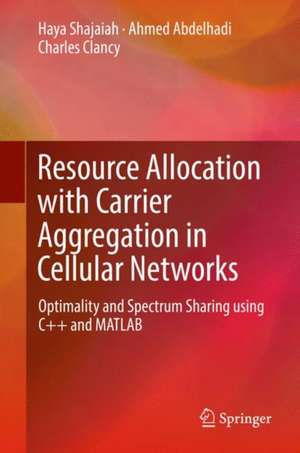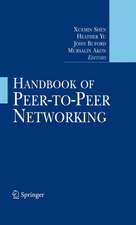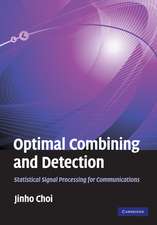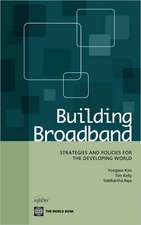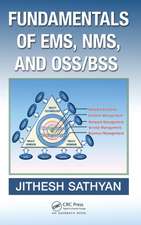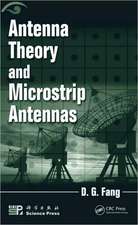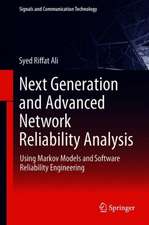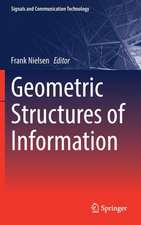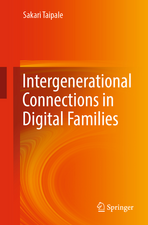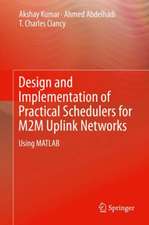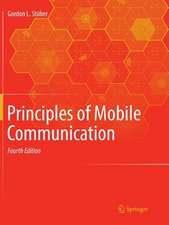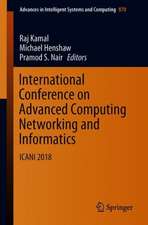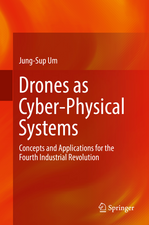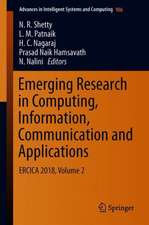Resource Allocation with Carrier Aggregation in Cellular Networks: Optimality and Spectrum Sharing using C++ and MATLAB
Autor Haya Shajaiah, Ahmed Abdelhadi, Charles Clancyen Limba Engleză Hardback – 13 iul 2017
| Toate formatele și edițiile | Preț | Express |
|---|---|---|
| Paperback (1) | 886.43 lei 6-8 săpt. | |
| Springer International Publishing – 11 mai 2018 | 886.43 lei 6-8 săpt. | |
| Hardback (1) | 892.42 lei 6-8 săpt. | |
| Springer International Publishing – 13 iul 2017 | 892.42 lei 6-8 săpt. |
Preț: 892.42 lei
Preț vechi: 1088.31 lei
-18% Nou
Puncte Express: 1339
Preț estimativ în valută:
170.77€ • 182.61$ • 142.38£
170.77€ • 182.61$ • 142.38£
Carte tipărită la comandă
Livrare economică 18 aprilie-02 mai
Preluare comenzi: 021 569.72.76
Specificații
ISBN-13: 9783319605395
ISBN-10: 3319605399
Pagini: 201
Ilustrații: XVI, 201 p. 65 illus., 62 illus. in color.
Dimensiuni: 155 x 235 mm
Greutate: 0.49 kg
Ediția:1st ed. 2018
Editura: Springer International Publishing
Colecția Springer
Locul publicării:Cham, Switzerland
ISBN-10: 3319605399
Pagini: 201
Ilustrații: XVI, 201 p. 65 illus., 62 illus. in color.
Dimensiuni: 155 x 235 mm
Greutate: 0.49 kg
Ediția:1st ed. 2018
Editura: Springer International Publishing
Colecția Springer
Locul publicării:Cham, Switzerland
Cuprins
Chapter 1. Introduction.- Chapter 2.Utility Functions and Resource Allocation for Spectrum Sharing.- Chapter 3.Multi-Stage Resource Allocation with Carrier Aggregation.- Chapter 4.Resource Allocation with User Discrimination for Spectrum Sharing.- Chapter 5.Resource Allocation with Carrier Aggregation for Commercial Use of 3.5 GHz Spectrum.- Chapter 6.RA with CA for a Cellular System Sharing Spectrum with S-band Radar.- Chapter 7.Utility Proportional Fairness Resource Block Scheduling with Carrier Aggregation.- Chapter 8.Conclusion and Future Trajectory.
Notă biografică
Dr. Haya Shajaiah is a Postdoctoral research fellow at Virginia Tech. She was awarded an Intelligence Community Postdoctoral Research Fellowship by the Oak Ridge Institute for Science and Education. Dr. Shajaiah received her B.S. in electronics engineering from Alquds University in Palestine in 2006, her M.S. in electrical engineering from The George Washington University in Washington, D.C., in 2009, and her PhD in electrical engineering from Virginia Tech in 2016. She was previously a Graduate Research Assistant (GRA) at Virginia Tech. Her current research interests include radio resource allocation, cognitive systems, spectrum sharing, and spectrum auctions.
Dr. Ahmed Abdelhadi is a Research Assistant Professor at Virginia Tech. He received his Ph.D. in Electrical and Computer Engineering from the University of Texas at Austin in December 2011. He was a member in Wireless Networking and Communications Group (WNCG) during his Ph.D. In 2012, he joined Bradley Department of Electrical and Computer Engineering and Hume Center for National Security and Technology at Virginia Tech. He is a senior member of IEEE.
Dr. T. Charles Clancy is an Associate Professor of Electrical and Computer Engineering at Virginia Tech and directs of the Hume Center for National Security and Technology. Prior to joining Virginia Tech in 2010, he served as a senior researcher at the Laboratory for Telecommunications Sciences, a defense research lab at the University of Maryland, where he led research programs in software-defined and cognitive radio. Dr. Clancy received his B.S. in Computer Engineering from the Rose-Hulman Institute of Technology, M.S. in Electrical Engineering from the University of Illinois, and his Ph.D. in Computer Science from the University of Maryland. He is a Senior Member of the IEEE and has over 150 peer-reviewed technical publications. His current research interests include cognitive communications and spectrum security.
Dr. Ahmed Abdelhadi is a Research Assistant Professor at Virginia Tech. He received his Ph.D. in Electrical and Computer Engineering from the University of Texas at Austin in December 2011. He was a member in Wireless Networking and Communications Group (WNCG) during his Ph.D. In 2012, he joined Bradley Department of Electrical and Computer Engineering and Hume Center for National Security and Technology at Virginia Tech. He is a senior member of IEEE.
Dr. T. Charles Clancy is an Associate Professor of Electrical and Computer Engineering at Virginia Tech and directs of the Hume Center for National Security and Technology. Prior to joining Virginia Tech in 2010, he served as a senior researcher at the Laboratory for Telecommunications Sciences, a defense research lab at the University of Maryland, where he led research programs in software-defined and cognitive radio. Dr. Clancy received his B.S. in Computer Engineering from the Rose-Hulman Institute of Technology, M.S. in Electrical Engineering from the University of Illinois, and his Ph.D. in Computer Science from the University of Maryland. He is a Senior Member of the IEEE and has over 150 peer-reviewed technical publications. His current research interests include cognitive communications and spectrum security.
Textul de pe ultima copertă
This book introduces an efficient resource management approach for future spectrum sharing systems. The book focuses on providing an optimal resource allocation framework based on carrier aggregation to allocate multiple carriers’ resources efficiently among mobile users. Furthermore, it provides an optimal traffic dependent pricing mechanism that could be used by network providers to charge mobile users for the allocated resources. The book provides different resource allocation with carrier aggregation solutions, for different spectrum sharing scenarios, and compares them. The provided solutions consider the diverse quality of experience requirement of multiple applications running on the user’s equipment since different applications require different application performance. In addition, the book addresses the resource allocation problem for spectrum sharing systems that require user discrimination when allocating the network resources.
Caracteristici
Provides a thorough analysis for future cellular systems on resource management for spectrum sharing;
Proposes a unified algorithmic framework based on dual optimization techniques;
Presents numerical results to demonstrate the effectiveness of the proposed solutions in improving network performance compared to traditional existing solutions.
Includes supplementary material: sn.pub/extras
Proposes a unified algorithmic framework based on dual optimization techniques;
Presents numerical results to demonstrate the effectiveness of the proposed solutions in improving network performance compared to traditional existing solutions.
Includes supplementary material: sn.pub/extras
